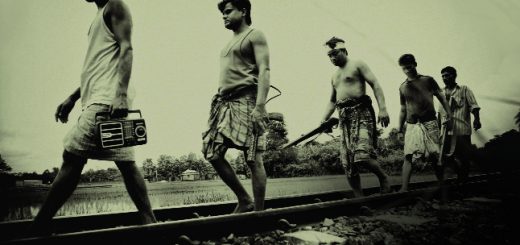Food and Freedom -Abu Tahir Mustakim
The loss of lives of millions of people due to famine during British colonial rule is well known. Most famines pave the way for regime changes as they are not natural disasters. It is a man-made disaster as failure in the food management remains the core cause of this disaster. In addition to independence, history has written about the efforts to maintain Bengali identity with fish and rice. In Bengali literature, there are works on this rice and there is the poetry of rebellion and revolution.
Therefore, the rulers tried hard to prevent famine in the post-colonial period in the Indo-Pak subcontinent. Still, when the shortage of rice is complained of, it is called ‘Silent Famine’ or Monga by politicians. Even after 75 years of independence of the subcontinent, ‘Mangte Hai Har Insaan; Roti, Kapra aur makan (every man wants assurance of food, clothing, shelter). Slogans are still immortal.
In the post-colonial period, the activists of the Azadi movement were vocal against the rulers who failed to meet the needs of the people. They raised the slogan ‘Yeh Azadi Jhoota Hai, Lakho Insaan Bhukha Hai’ (This freedom is a lie to millions of starving people) and raised questions about freedom. It has shaken the throne of the rulers. They tried to fix the situation.
Bangladesh gained independence over time. The 1974 famine in newly independent Bangladesh has gone down in history. World was saddened by seeing the starving people and the unexpected deaths of countless people in that famine. Seeing this situation, the poet roared: “Vat de Haramzada, noyle manchitra khabo” (serve me rice now, or I will eat the map). What happened to poet Rafiq Azad after this roar is unknown to most people.
The world has seen many famines throughout history including the famine in Ukraine in 1932-33. Famine may be caused by drought and other natural calamities which deplete stock of food. But if the famine can be managed properly, the government in power during the famine can survive the scare of regime change. As is the case with the famine in Arabian Peninsula in 638 CE. Arabia fell into severe drought followed by a famine. Soon after, the reserves of food at Medina began to run out. Umar ordered caravans of supplies from Syria and Iraq, and the caliph personally supervised their distribution within the initial stage of his ten-year caliphate. He survived the scare of regime change as he managed the famine successfully. He even used to avoid taking food himself intermittently and he looked like a real famine-stricken person. He set the example of how to manage famine even in a food-starved desert area.
However, in 2023, journalist Shamsuzzaman Shams was picked up from his home at 4am by plainclothes police and was accused of spreading ‘false news’ over an article about cost of living crisis, according to his newspaper, Prothom Alo.
Hours after the report was published in both print and online, lawyer Nijhoom Majumder posted a video on his Facebook page that has more than 200,000 followers declaring that he would investigate whether Hossain had indeed given that quote to Prothom Alo or the paper ran this story to “embarrass the government”.
Rights groups say the Digital Security Act under which Shams was charged has been widely used by the government to muzzle journalists and critics.
According to a local think-tank, nearly 3,000 people have been charged under the Digital Security Act since it was enacted in 2018, including about 280 journalists.
This has stoked concerns that under Prime Minister Sheikh Hasina, who has been in power in the south Asian nation of 170 million people since 2009 is becoming increasingly authoritarian.
Reporters Without Borders ranked Bangladesh 162 of 180 countries in its 2022 World Press Freedom Index. It is ranked below Russia (155) and Afghanistan (156).
In recent months, Bangladesh’s dwindling number of independent media and journalists have come under increasing attacks by the government and the ruling party.
According to the Center for Governance Studies, a total of 138 cases were filed against journalists under the DSA between January 2019 and August 2022, in which a total of 280 people were accused and 84 were arrested.
Majumder tracked down Sobuj and said that he had not given that particular quote. Channel 71, a pro-government television station, accompanied the lawyer and ran a report accusing Prothom Alo of using false quotes.
The situation seems to be that the government has taken the journalist’s report on the increase in commodity prices during the month of independence as anti-independence. And based on that, the journalist was arrested, a case was filed against him, and he was sent to jail without bail. And those steps have been supported by government ministers and officials.
The cost of food has soared in Bangladesh since the middle of 2022 following Russia’s invasion of Ukraine. Taka has fallen sharply against the US dollar.
However, on the day the journalist was arrested, 29 March 2023, a research survey found supporting for his statement. The real situation is that where Bangladesh stands in 2023, Bengalis have forgotten to eat fish and rice. Seventy-four per cent of families in cities and villages of Bangladesh are in debt and 71% of households are eating less. And 90% of them have changed their diet due to poverty. This information was reported by the private research institute South Asian Network on Economic Modeling-SANEM. A few days ago, another private think tank, the Center for Policy Dialogue-CPD, published a similar chart. Their research specifically states that people are suffering from inflation due to the wrong policies of the government.
According to Sanem’s research report, several countries, including India and Malaysia, have succeeded in controlling inflation despite the instability of the global market. But Bangladesh failed. Food inflation in the country has risen to 25.37 per cent. That number is three times more than the government institution Bangladesh Bureau of Statistics-BBS.
Research shows that 37% of households that changed their eating habits reduced their rice consumption. Meat consumption decreased the most (96.4%). Then fish 88.22% and eggs 77% and 81% of people reduced the use of oil in food. Low-income people have also changed the quality of food to reduce costs. They have turned to less expensive food to reduce the consumption of rice, pulses, fish, and eggs.
According to the SANEM survey, 37% of the families said that they now have to go without food for one meal. Over 71% families are eating less than required and 18% of households told surveyors that there had been days when they had gone without food for an entire day. Food insecurity is most prevalent among urban low-income households.
Seventy-four per cent of households that have been borrowing in the past six months are unlikely to stop borrowing. Rather, 85% of households feel that if the situation continues like this, they will have to borrow more in the next six months. According to the survey, 35% of the families are losing their savings and 55% of the families have diverted their savings.
Around 45.42% of people have taken micro-loans during the mentioned period and 36.53% of people borrowed from friends or close people. Some 22.63% took loans from cooperative societies, 13.90% have taken bank loans and 2.80% people have taken money lender loans. In response to the question of whether government initiatives are enough to face the current challenges, most people said that government initiatives are not enough.
It doesn’t end there. A survey by the government organization Bangladesh Bureau of Statistics-BBS says that half of the country’s street children are in Dhaka. According to their survey, almost half (48.5%) of the total street children in the country are in Dhaka Division while 82% of the total street children are boys, and 18% are girls. More than half of street children are between 10 and 14 years old and 12 per cent of street children are drug addicts. However, the total number of street children in the entire country and divisions was not included in the survey.
Statistics show that nearly one in three of these children (more than 33%) do not have access to the most basic amenities in life. About half of the children sleep on the ground with jute bags, cardboard, pieces of plastic, or a thin blanket. Seventeen per cent of children seek security and comfort by sleeping together. Around 20.9% collect waste in most cases for livelihood and 18.4% do begging while 16% work in the automobile and construction sectors. Apart from this, 14.8% work in tea shops, factories, and workshops.
State Minister for Planning Shamsul Alam said at the survey results release ceremony, ’’The reflection of the cry behind the development has come up in this street child survey. Their rights deserve a deep discussion. Street children are a great waste of the nation’s resources. A special project should be taken for them. ‘’
The State Minister for Planning at least acknowledged that there is a cry behind the development. Because, behind the tide of development in government-controlled and government-loyal media, the life pains of common people are never reflected. The media has failed to highlight how people’s lives are going behind the remittance flows, foreign exchange reserves, and per capita income growth figures.
It would not be right to consider him an opponent of freedom and liberation war if someone broke the fence and brought the reality close to life on the pages of the newspaper. Because it is very easy to change the ethnic identity of the people of Bangladesh from Bengali to Bangladeshi through court order. But it is very difficult to prevent 90% of people from changing their eating habits by compulsion. And if this difficult task is not done, the Bengali identity of fish and rice will be erased.















Recent Comments